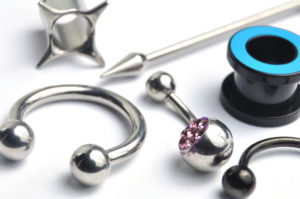
How do genital piercings affect your health?
Image: Shutterstock
Genital piercings aren’t anything new—they were written about as early as the second century in the Kama Sutra. In the 1990s they experienced a resurgence, and today, having a bit of bling below the belt is more common than ever.
But there’s also a lot of contradictory information out there when it comes to “intimacy piercings.” Do they increase your chance of getting an STD? Do they actually increase your sexual pleasure? Are there other side effects? Or are genital piercings entirely benign?
When it comes to genital bling, the penis gets more attention. With far more surface area available, men can choose between eight different styles. The most popular is the Prince Albert, which involves inserting jewelry through the external urethra and out the base of the frenulum. It’s believed to increase a female partner’s pleasure, since in some positions, the piercing would stimulate the G-spot directly.
But women aren’t left out of the piercing game, either: their options include clitoral hood piercings, which have been shown in one study to enhance a positive sexual experience.
Recent research shows that about 2% of men and 0.8% of women between the ages of 18 and 50 have at least one genital piercing. When interviewed, people generally say they got a piercing to please their partner.
It’s not all sunshine and orgasms, though. While the rate of STIs contracted by individuals with piercings is lower than expected (a 2005 study found that, of 445 men with piercings, 18% reported STIs after being pierced), it’s still definitely a concern. And it’s not the only one: piercings can result in irritated skin, non-sexual infections, and ripping or tearing at the piercing site. That’s leaving aside the propensity for the piercing to poke holes in a condom or dislocate a diaphragm.
Other potential problems include hyper sensitivity in the piercing area and changes in urinary flow. In that previously-mentioned 2005 study, some respondents reported trouble aiming or even having to sit down to urinate after getting their genital piercing.
There’s a more insidious concern, too: Men generally look online for information about genital piercing instead of talking to their doctors about it. While it’s definitely possible to find good information online, there’s no guarantee that any particular website will include important information on hygiene and safety when it comes to genital piercings.
So it’s great that you’re reading this article… but make sure you talk to your doctor before installing any genital bling! You’ll want to be up to date on all the facts before deciding if and how you want to decorate down there.
